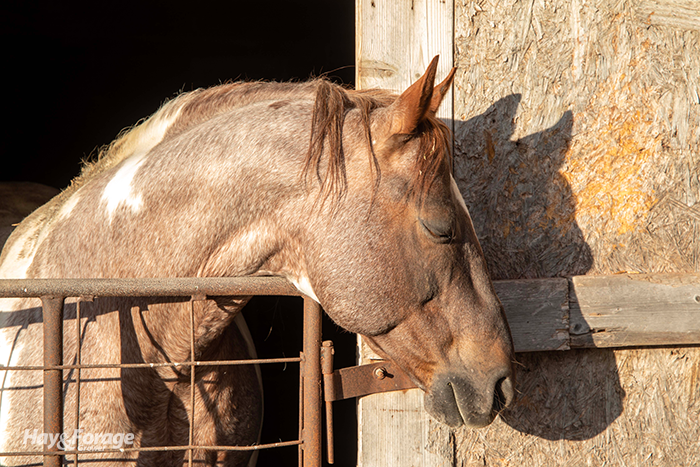
Equine asthma, or heaves as it is often referred to, is an inflammatory reaction to inhaled dusts, molds, or other allergens. Horses that contract the disease have swollen airways, which constrict and clog with excess mucus and make it difficult to breath. Severe asthma may lead to pulmonary or heart health issues as well.
Hay and bedding are a common source of airborne particles in horse barns. Hay producers know that horse owners are often defiant in their stance not to purchase dusty or moldy hay. Horses that already have asthma can have their breathing severely compromised by such hay.
In a study published in the Journal of Veterinary Internal Medicine, researchers at the University of Montreal found that soaking hay with water before feeding was effective in reducing the clinical signs of asthma, but a specific protocol must be followed.
The research trial began by selecting 10 horses with a confirmed asthma history. They were housed indoors and fed dry/dusty hay for six weeks to trigger asthma symptoms. Clinical signs, lung function, and airway inflammation were assessed and documented.
Next, the horses were divided into two groups of five. One group was fed alfalfa pellets, which is one method, although expensive, of reducing dust. The other group received hay that had been fully submerged in cold water for 45 minutes prior to feeding. The water was then discarded after each soaking. If the hay dried out before being consumed, it was removed from the horse’s stall. This feeding protocol was continued for six weeks, and the researchers measured each horse’s lung function, lung inflammation, and mucus production at two, four, and six weeks.
Horses fed the water-soaked hay had fewer clinical signs of asthma, improved lung function, and reduced tracheal mucus production compared to when they started eating the wetted hay. The same improvements were noted for those horses that consumed the pellets.
The Canadian researchers conclude that soaking hay is an effective means to reduce the symptoms of severe asthma; however, the hay must be soaked for 45 minutes and any dried hay that isn’t consumed needs to be discarded. They recognized that this protocol might be too demanding for many horse owners.

